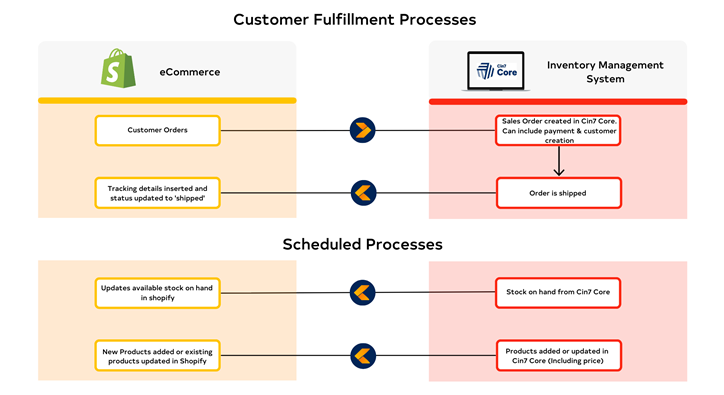Shopify has emerged as a popular choice for entrepreneurs and businesses looking to establish an online presence. While it excels in numerous areas, it's important to understand the limitations of Shopify as an inventory management system when listing your products with retailers.
Modern businesses often initiate their growth through e-commerce channels, utilizing platforms like Shopify to facilitate their expansion. With its comprehensive features for basic inventory management, online payments, order processing, and some shipping integrations, Shopify provides a solid foundation.
However, as your brand and product range begin to flourish, being listed in retailers' stores—whether physical or online—becomes a significant achievement accompanied by certain complexities. Most modern-day retailers require businesses to have EDI (Electronic Data Interchange) capabilities, enabling automated order fulfillment and seamless trading.
This is where businesses using Shopify (or similar platforms) can encounter challenges, as Shopify lacks the necessary features and integration capabilities required for compliance with retailers and efficient inventory management.
In this article, we shed light on the limitations of e-commerce platforms such as Shopify, including the absence of advanced features like ASN and PO Acknowledgements, as well as EDI integration. By recognizing these gaps, businesses can make informed decisions and explore alternative solutions for their inventory management needs when embarking on the next stage of their growth journey.
Advanced Shipping Notice (ASN) Capability
Shopify's native inventory management features lack the ability to handle Advanced Shipping Notices (ASNs). ASNs play a vital role in supply chain management, providing businesses with detailed information about incoming shipments. Without ASN capabilities, businesses may struggle to gain visibility into their inventory, leading to potential fulfilment delays and stock management challenges.
When integrating with a retailer, the EDI system automatically sends ASN’s from the inventory management system to the retailer so that they have visibility of when the stock is due to arrive.
Purchase Order (PO) Acknowledgements
PO acknowledgements are critical for ensuring seamless communication between buyers and suppliers. Unfortunately, Shopify's system does not include PO acknowledgement functionality. This absence can hinder efficient order processing and may result in miscommunication between buyers and suppliers regarding order confirmation, delivery dates, and other important details.
When integrating with a retailer, the EDI system automatically sends PO acknowledgements from the inventory management system to the retailer to confirm they have received the purchase order and can fulfil it based on current stock levels. Unique rules and logic can also be implemented e.g. always leave 5 of each SKU available to ensure there is safety stock available.
Real-time Inventory Updates
Shopify provides basic inventory management features that allow businesses to track stock levels and manage product availability. However, the system lacks real-time inventory updates, which can be a significant drawback for businesses with high order volumes. Delayed inventory updates may lead to overselling, backorders, or missed sales opportunities, potentially impacting customer satisfaction and revenue.
Another example of this is when products are sold via a wholesale channel or in a store as the orders and stock levels will not be updated in Shopify, leading to incorrect inventory levels.
Multiple Warehouse Management
For businesses with multiple warehouses or distribution centers, Shopify's inventory management capabilities fall short. The platform does not offer built-in functionality to effectively manage and track inventory across different locations. Without centralized control over stock levels and efficient inventory allocation, businesses may face difficulties in optimizing their supply chain operations and meeting customer demands.
EDI also enables direct integration with 3PL warehouses as well as rules and logic to determine which warehouses to automatically fulfil orders from, further streamlining your inventory management processes.
Batch and Expiry Date Tracking
Certain industries, such as food, cosmetics, and pharmaceuticals, require robust batch and expiry date tracking to ensure compliance and prevent the sale of expired products. Unfortunately, Shopify's inventory management system lacks dedicated features for managing batch numbers and tracking expiry dates, making it less suitable for businesses operating in these sectors.
Complex Product Variants Management
Shopify provides basic product variant management capabilities, allowing businesses to offer different options for their products. However, the platform may not be ideal for businesses with complex variant requirements. Limitations in managing intricate product configurations, such as matrix variants or configurable bundles, may lead to difficulties in accurately representing and managing inventory, potentially impacting sales and customer experience.
Conclusion
While Shopify is a powerful ecommerce platform, it's essential to acknowledge its limitations in inventory management and B2B integration. The platform's inventory features lack some crucial functionalities such as ASN and PO acknowledgements, real-time inventory updates, and more that will be critical when trading with large retailers.
A common approach for our customers in this scenario is to implement a centralised inventory management system which can facilitate orders from their retail customers as well as keep their Shopify e-commerce store. See the flow of data between a common IMS Cin7 Core (previously DEAR) and Shopify below:
By understanding these gaps, businesses can explore alternative inventory management solutions, easily integrating them with their existing Shopify store and their key trading partners.
So, what are the alternatives or complimentary systems to Shopify? Here’s a quick list of commonly used inventory management systems and ERPs for retail suppliers:
- Cin7 Core (Previously DEAR)
- Unleashed
- Zoho Inventory





